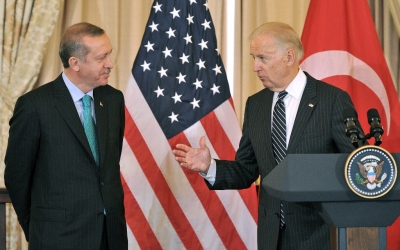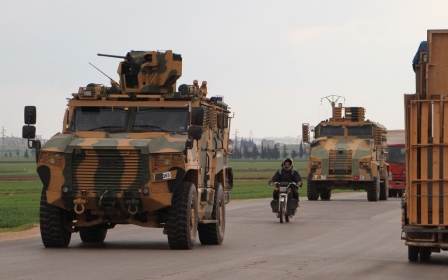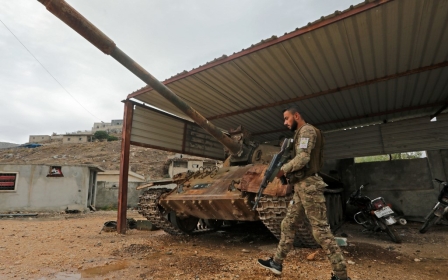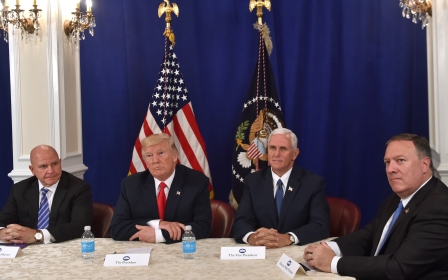US-Turkey ties: Repairing the relationship must start in Syria

The Syria conflict has created a humanitarian catastrophe, with millions of civilians internally displaced or turned into refugees. It has become a proxy war among regional and global powers, as the aspirations of Syria’s early protesters have been crushed by a criminal regime over the past decade.
The conflict has deeply destabilised the region and divided Europe, fuelling the rise of anti-migrant sentiment. Most consequentially for the Nato alliance, it has driven a wedge between two major allies: Turkey and the US.
The two states do not simply differ in their Syria policies; they support different armed groups on the ground. Turkey has supported the Free Syrian Army and other opposition groups targeting the Assad regime, while the US has invested in the Syrian Democratic Forces (SDF), the backbone of which comprises the People’s Protection Units (YPG), the Syrian branch of the Kurdistan Workers’ Party (PKK).
Successive administrations have failed to articulate a clear strategy and rationale for the US military presence in Syria
The PKK is recognised as a terrorist organisation by the US, Turkey and the EU, while US policy in Syria has created an artificial distinction between the PKK and the SDF. This distinction has been necessary for its potential legal ramifications (ie, the implications of supporting a terrorist group) and as an attempt to appease Turkey’s opposition.
In the fall of 2014, the Obama administration air-dropped light weapons and ammunition to the YPG, which was fighting the Islamic State (IS) in the border town of Kobane. The US assured Turkey that this was a temporary measure to prevent an IS takeover.
New MEE newsletter: Jerusalem Dispatch
Sign up to get the latest insights and analysis on Israel-Palestine, alongside Turkey Unpacked and other MEE newsletters
Turkey still did not trust the YPG, but it facilitated the passage of Iraqi Kurdish forces through Turkish territory to aid the fight against IS in Kobane.
US support for the YPG strengthened to a level where the US military openly lauded its military successes against IS, most of which would not have been possible without US air support, training and arms. Instead of investing in Syrian opposition groups, the US made a conscious choice to invest in the PKK’s Syria branch partly due to the PKK’s decades-old fighting experience (against Turkey), and its tight command-and-control structure.
For the PKK, this has been a highly rewarding relationship - one that could yield territorial gains in northern Syria and even in Iraq, along with international recognition. The collapse of Syria offered a vacuum it could fill, and the US appeared ready to take this “low-cost” engagement as part of its light-footprint policy.
Military intervention
But Turkey was not willing to sit idly by while the PKK gained ground in northern Syria and garnered western support. In August 2016, Turkey launched a military intervention along its border and inside Syria, aiming to clear the area of IS and YPG control. Turkish forces also stopped the Assad regime from attacking Idlib, which could have resulted in another massive refugee outflow.
Turkey’s strong criticism of US support for the YPG fell on deaf ears in Washington, where politicians were riled up when former President Donald Trump decided to abruptly pull out of Syria. Turkey was not necessarily an advocate of the US exit, but it was attacked by members of the media and politicians for questioning the rationale of the US presence after the territorial collapse of IS.
Trump largely continued the Obama policy of supporting the YPG on the ground, essentially creating an autonomous region under the PKK’s control. But after the US pullout, viewed widely as Trump abandoning the Kurds, Turkey took matters into its own hands by intervening militarily.
Some observers have suggested that Turkey could come to some sort of accommodation with the YPG, akin to its relations with the Kurdistan Regional Government (KRG) in Iraq. This comparison, however, is deeply flawed, as the PKK has a four-decade history of fighting against Turkey, while the KRG has not taken such actions. The PKK continues to carry out attacks inside Turkey, Syria and Iraq, while trying to build capacity, thanks to US support.
Working with allies
Turkey’s own military operations in Syria have greatly diminished the prospects of the PKK being able to create a contiguous “statelet” with access to the Mediterranean. Turkey’s presence on the ground has greatly reduced its anxiety about the PKK’s game plan in Syria. Still, continued US support and glorification of the YPG’s secularism, female fighters and dedication to combatting IS is poisoning the relationship between the two Nato allies.
US policy in Syria has oscillated between aiming to prevent a resurgence of IS, confronting Iran, pushing back against Russia, providing humanitarian aid, and even protecting Israel. And yet, successive administrations have failed to articulate a clear strategy and rationale for the US military presence in Syria.
Some analysts see the financial (around $1.5bn a year) and human costs of the US presence to be negligible, but this is all a matter of perspective, considering the accompanying frictions with a Nato ally.
The Biden administration needs to take a long and hard look at US strategy in Syria. The investment in the YPG is not cost-free, and it will continue to destabilise US relations with Turkey, which has been shouldering an enormous humanitarian burden while fighting terrorism in the region. Continuing to ignore Turkish concerns is untenable.
As Biden has vowed to work with allies, Turkey must top his list of countries to work with in various arenas, starting with Syria. Failing to engage Turkey on a meaningful level will damage bilateral relations, worsen humanitarian suffering, destabilise the region, divide Europe, and deepen frictions within Nato.
The views expressed in this article belong to the author and do not necessarily reflect the editorial policy of Middle East Eye.
Middle East Eye delivers independent and unrivalled coverage and analysis of the Middle East, North Africa and beyond. To learn more about republishing this content and the associated fees, please fill out this form. More about MEE can be found here.







